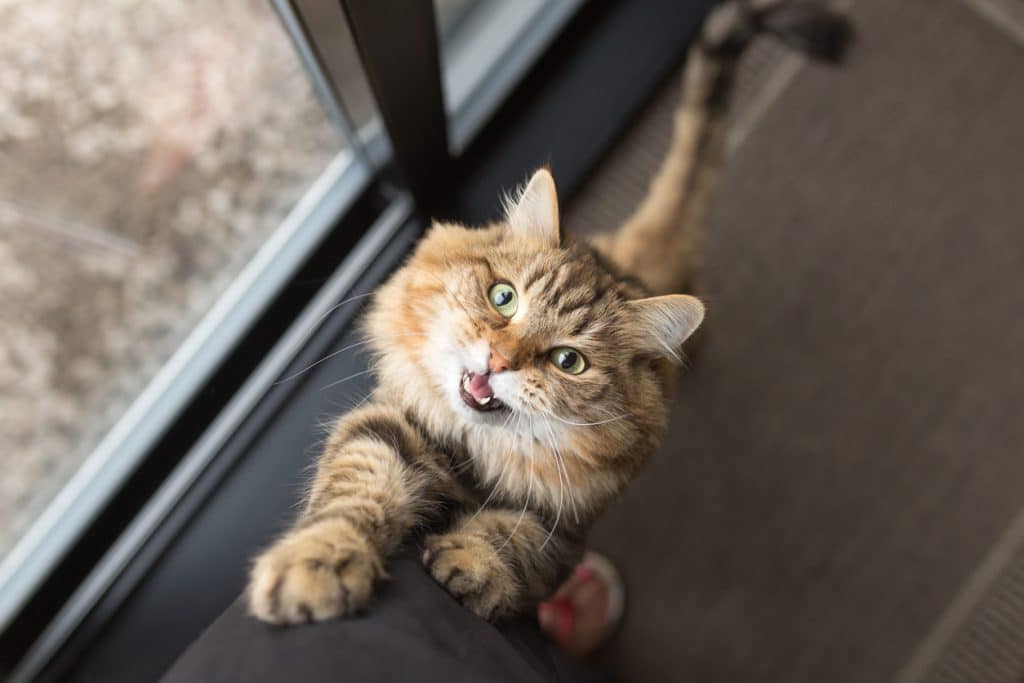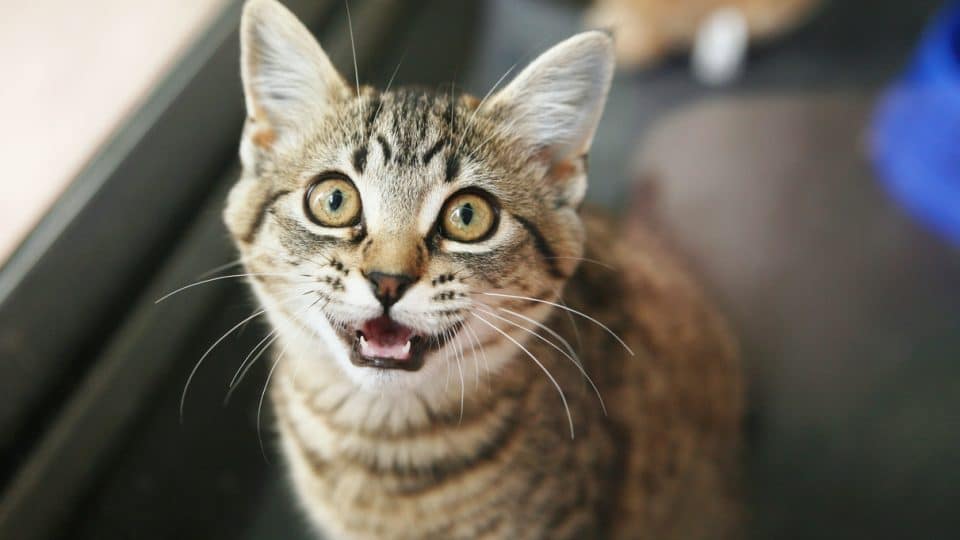All cat owners rely on meows to help decipher how their pet feels and what they might need. But did you know cats haven’t always used this type of communication?
Researchers believe cats create vocal sounds like humans do — via a larynx (aka the ‘voice box’) and supporting throat muscles. However, they’ve likely not always been inclined to make meows: it’s thought cats only began to do so once they began socializing with humans and became domesticated creatures.
In fact, adult cats very rarely meow to each other. “The most common reason cats meow is because they want something from us, their humans!” shares Clare Hemington, accredited cat behaviorist and founder of Honeysuckle Cat Toys. They can also do so to convey joy, as a form of greeting, or show displeasure or anxiety, among other things.
Want to feel like a meow-stermind? Here is a closer look at why cats meow, and why they may be extra vocal towards you.
Meowing More than Normal?
Certain factors or activities are linked to temporary increases in meowing, such as:
- You just got home
- They’re feeling hungry
- They’re bored and need entertaining
- The litter box is full
- They want to go outside
- It’s in their breed (Bengals, Burmese, and Oriental cats, including Siamese, are naturally a lot more vocal);
- They’re in heat
- They’re getting older
To Greet You After Being Alone
Whether you’re returning home from work or your feline is making a reappearance after prowling the neighborhood, “some cats meow as a greeting,” says Linda Hall, a certified cat behaviorist at Cat Behavior Alliance. Adult cats rarely meow at each other — and this form of vocalization is something domesticated felines have developed and learned to communicate with humans.
To Get Attention
Sometimes it can be hard to be a small cat in a big human world, and they might meow simply to let you know they’re still around and want a bit of TLC. This attention demanding behavior can have downsides, too, as we’ll explore a little later.
To Start a Conversation
In the same way some humans are more talkative than others, some cats just like to meow away. “Breeds like Siamese are known to be very vocal,” notes Rita Reimers, also a certified cat behaviorist at Cat Behavior Alliance.
They’re a Kitten
“Kittens meow to communicate with their mama. They cry out for her and tell her when they are hungry,” explains Reimer. “If the kitten is feral, once he no longer is nursing on mama, he doesn’t need the meow and will lose that ability.”
Being Territorial
For cats that venture outdoors, loud meowing and yowling noises — particularly at night — can be a way of asserting their presence and warning other cats off of their territory.
They’re Hungry
Domestic cats rely on their human owner to provide food — they can’t just go into the cupboard and get it themselves! So, cats often meow to let you know it’s time for dinner. How much to feed your cat will largely depend on their life stage and lifestyle, so be sure to check in with your vet and ensure you regularly keep tabs on your cat’s weight and body profile.
Feeling Sick
Felines can’t take themselves to the vet if they’re under the weather. Sometimes, your cat might become more vocal if they’re trying to tell you about their pain and need a bit of help feeling better.
If your cat is feeling unwell, it’s best to contact a vet to determine the underlying cause. “In feline cognitive dysfunction, some cats may have behavioral changes including change in vocalization; particularly a change in vocalization pattern such as vocalizing more at night,” says Dr. Katherine Pankratz, DVM, Behavioral Medicine Clinician at Animal Behavioral Clinic in Portland, Oregon.
Have Energy
There’s no TV watching or reading to keep cats entertained. If they desire some stimulation or interaction, meowing could be their way of letting you know they want to play, explains Hall. If your cat is meowing at a lot for your attention or to get you to play, try switching up her toys for a new challenge or give her a new, high-up spot to satisfy her need to perch.
Feeling Unsure or Anxious
Moved to a new area or introduced another pet into the home? According to The Humane Society of the United States, “a cat who feels anxious or confused may meow to seek reassurance.”
“Cats can become stressed due to many things, particularly when there is a major change in the environment like moving or the addition or loss of a family member,” Dr. Pankratz explains. Cats also get lonely and could become vocal when experiencing separation anxiety from you, or another furry companion. A loud, mournful yowl that’s low in pitch might clue you in on your cat’s anxious feelings. If this sounds like your kitty, review these recommendations for soothing your cat’s anxiety, then chat with your vet.
How to Interpret Cat Meows
“Cats can make nearly 100 different sounds,” reveals Reimer — so no wonder it can be tricky to decipher what your cat is trying to tell you. You might already subconsciously know your cat’s tone when she’s meowing about different things, but two specific types of vocalizations to listen for are:
- Affiliative vocalizations. This vocalization is shorter in duration and higher in frequency. You might hear this type of vocalization when your cat is “chirping” at the birds, is in anticipation of food, or when an intact female cat is in heat.
- Agonistic vocalizations. This vocalization is longer in duration and lower in frequency, and is typically associated with defensive or aggressive behaviors. Think a growl, hiss, or a loud, harsh shriek expressed during a fearful or painful situation, Dr. Pankratz says.
Remember that cats also use other approaches to communicate with humans and other felines — such as swaying their tails, giving gentle head butts, and engaging in playtime.
| Type of sound | What it means |
| General meow | This “is the most basic meow,” says Hall, and “is a bit of an all-purpose sound.” |
| Short meow | This might sound like a ‘meep’, notes Reimer, and is “usually a sign they are trying to get your attention.” |
| Series of meows | Two or more meows show “they are very insistent on getting what they want,” Hall explains. |
| Low-pitched meow | This can be a sign your cat feels depressed or uncomfortable. |
| High-pitched meow | One you’ll want to hear more often, as it’s an indication your feline is happy. |
| Drawn-out meow | A form of complaint, this often arises when we have something they want, shares Reimer. |
| Purr | A sign of happiness, or that your cat is comforting itself as it feels anxious, unwell, or in pain. |
| Hiss | This is an involuntary sound, explains Hall — and indicates “they are scared or startled. Comfort your cat and watch to make sure that fear doesn’t turn into an attack.” |
| Yowl | A way of communicating to other cats, it’s “almost a screaming plea for their attacker to go away!” notes Reimer. Female cats are also prone to yowling when in heat. |

iStock/marieclaudelemay
Feline cognitive dysfunction can cause frequent meowing
If you have an older cat, increased vocalization may also signal feline cognitive dysfunction, which more than a third of felines over the age of 11 develop. The condition “can present as general confusion, resulting in meows — which, in cats that are going deaf, can be ear-splitting,” Hemington shares.
“Cats get hearing loss, sight loss, and dementia as they age,” reveals Hall. “This can cause them to get louder, just like the way Grandpa started talking to you loudly as he aged. He can’t hear himself.”
You might notice your cat is a lot more vocal during nighttime hours — which can be frustrating if you’re trying to sleep, but is normal for them to do. Cats are what’s known as crepuscular, which means they’re most active around dawn and dusk. “This is when they tend to increase not only their physical activity, but their vocal activity too,” Hemington reveals.
It’s worth noting that excessive nighttime yowling has both normal explanations, and can also be a sign of more serious health conditions, so it may be worth a conversation with your vet if you’re concerned about your cat’s health and wellbeing, especially if you notice any sudden or significant change in your cat’s behavior or appearance. “It’s always a good idea to get it checked out by your vet,” she adds.
How to Stop Excessive Meowing
Try switching up your own behavior, recommends Hemington. “If each time [he meows] you either stroke him, play with him, or give him food, you might inadvertently be rewarding the very behavior you would prefer he didn’t do quite so much,” she explains. Keep in mind if your cat likes these “conversations” and you suddenly stop “talking” with her, it could confuse your cat and cause her to meow even more.
As such, consider changing when you give your kitty treats. Hemington continues: “[By] rewarding him instead when he is silent, he should soon learn that his meowing tactic isn’t working but being calm and quiet is.”
It’s also important to remain calm, Hall states, and understand when to offer strokes. “If you know your cat is okay and is just meowing for attention, don’t give in when you are sleeping!” she says. “If they get attention, it will never stop pestering you at 3am.”
Finally, meowing — excessively or otherwise — can signal upset or stress among some cats. In these cases, anxiety aids can be a great help, says Reimer, along with playing relaxing music.
When Does Meowing Mean Something Is Wrong?
The good news is that your cat probably isn’t meowing to express pain.
“Meowing is what many people perceive a cat should do when they are in pain,” Dr. Pankratz says. But the reality is that if your cat is in pain, she’ll probably try to hide it. “Cats are often stoic, with a need to not draw attention from potential predators to survive. Often, cats are much more likely to be quieter and more aloof with less social interactions when they are in pain.” Of course, this doesn’t mean any abnormal or excessive meowing should be ignored.
Certain illnesses that do encourage more frequent bouts of meowing in cats include “hyperthyroidism, hypertension, problems with their larynx (like infection), or urinary blockages, just to name a few,” notes Reimer. So, look for other signs of a stressor and call your vet when in doubt.
If all is clear in the health department, then consider your cat’s social and psychological needs. “Adjust the environment to set you and your cat up to succeed,” Dr. Pankratz says. This might mean cleaning her litter box more frequently, or setting aside dedicated time for play.


